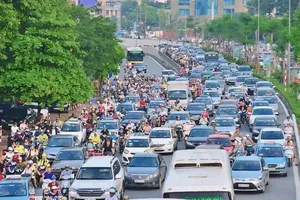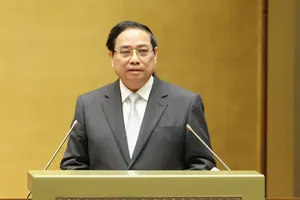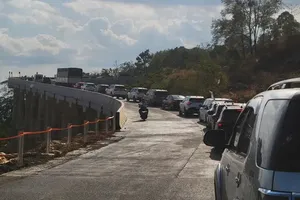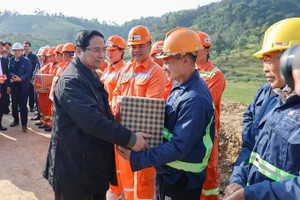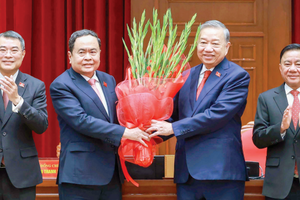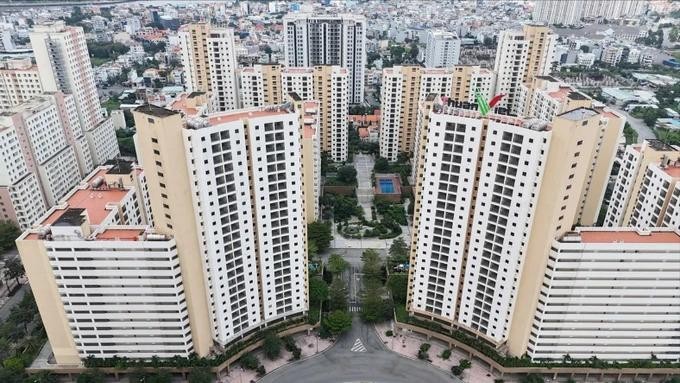
Moreover, this is compounded by a culture of harassment, an obsession with perfectionism, and an aversion to risk. Additionally, outdated mindsets, bureaucratic sluggishness, and a reluctance to embrace innovation, coupled with a deficiency in dynamism and creative problem-solving, have contributed to a significant inertia within the administrative framework.
This situation has led to significant wastage in society, particularly in term of missed development opportunities.
Thousands of apartments in the Binh Khanh resettlement area in An Khanh Ward in Thu Thiem New Urban Area in Thu Duc City were completed in 2015 but remain unoccupied. Despite significant investments in maintenance and repairs, totaling over VND70 billion in some years, the vacant apartments have continued to deteriorate.
At the request of Ho Chi Minh City, the Prime Minister has approved the auction of a cluster of 3,790 apartments. The city initially set the starting prices at VND8,800 billion in 2017, VND9,100 billion in 2018 and VND9,900 billion in 2021. However, despite the city's attempts to hold three auctions, no bidders agreed to buy the condo.
At the end of this year, the city completed a series of procedures to continue auctioning these 3,790 resettlement apartments.
Due to the construction of apartments taken from budget capital and bank loans, Ho Chi Minh City must obtain approval from the Central Government and Prime Minister for any changes or repurposing. The prolonged approval process has resulted in thousands of vacant apartments, which is a significant waste of resources, particularly in a densely populated city like Ho Chi Minh City where housing is in high demand.
In fact, loose coordination between administrative agencies is a major obstruction resulting in delays of the work, easily leading to waste. Regarding this issue, the Prime Minister issued the Document 622/TTg-TH directing to thoroughly overcome the situation of delay in handling recommendations and proposals sent by localities and agencies.
Localities and organizations that possess recommendations and proposals are required to actively encourage ministries, sectors, and relevant agencies to address these matters. Likewise, within each province and city, the collaboration between departments and district levels presents a significant challenge.
During discussions regarding the socio-economic conditions of Ho Chi Minh City, Chairman Phan Van Mai of the municipal People's Committee has frequently highlighted the issue of inadequate coordination. He noted that in order to provide counsel to the Ho Chi Minh City People's Committee, official documents often circulate excessively among units, with certain issues necessitating repeated discussions.
In a recent government inspection report for Dong Nai Province, the Government Inspectorate identified a significant delay in administrative procedures and public service delivery due to avoidance and shirking of responsibility. The inspection, conducted between 2021 and 2023, found that 15.5 percent of administrative procedure records (85,270 records) were overdue.
An analysis of the electronic one-stop systems of the Department of Construction and the Department of Planning and Investment revealed that overdue records accounted for more than 50 percent. Furthermore, the Department of Natural Resources and Environment had 824 overdue records, primarily attributed to a lack of financial obligation notifications from the Dong Nai Provincial Tax Department. Despite these issues, the department's electronic one-stop system falsely indicated that these records had been processed and resolved within the prescribed time limit. A closer examination of 58 overdue records revealed that 8 were delayed for periods ranging from 40 days to 24 months.
The Government Inspectorate has highlighted that the delay arose from the lack of responsibility among certain members of the Provincial People's Committee and leaders of agencies and organizations in addressing specific cases. It was noted that 13 out of 58 overdue inspection records were delayed due to avoidance and shirking of responsibility.
An inspection at the Ministry of Transport on the same subject during 2021-2023 by the Government Inspectorate also revealed that Le Quoc Company directly submitted its documents to the Vietnam Maritime Administration, but the administration took 10 months to process them. Subsequently, the Ministry of Transport and the Vietnam Maritime Administration repeatedly requested the company to supplement and complete its documents, which was against regulations.
Recently, various solutions have been proposed to address the evasion and shifting of responsibilities, and the fear of accountability. In 2023, the Standing Committee of the Hanoi Party Committee issued Directive 24-CT/TU (on strengthening discipline, order, and responsibility for handling tasks within the political system of Hanoi). After a year of implementing the Directive 24, Hanoi has inspected, monitored, and audited public service, detecting violations by 873 organizations and individuals and taking action against 368 of them. Although discipline, order, and responsibility in the city's political system have improved, some officials still struggle to meet the new demands and tasks.
The 2023 PCI (Provincial Competitiveness Index) and PGI (Provincial Green Index) reports by the Vietnam Chamber of Commerce and Industry (VCCI) indicate a decline in the proactive dynamism of local government apparatuses compared to previous years.
Additionally, 20 percent of businesses reported that provincial responses to unclear points in central policies/documents were to "delay implementation, seek guidance" and "do nothing." These figures partly explain why, more than two months after the Land Law took effect (from August 1, 2024), no provinces have fully issued the necessary documents within their authority, and some have not issued any documents to implement the law.
Consequently, on October 10, Prime Minister Pham Minh Chinh signed Directive 105/CĐ-TTg, focusing on directing and implementing the Land Law, and criticized provinces for their delays in issuing detailed documents and guidelines for this law's implementation.
If delays in implementing the Land Law affect the interests of organizations and individuals and local socio-economic development opportunities, delays in disbursing public investment capital even further hinder socio-economic development and social welfare goals. The main cause is the capacity of officials, civil servants, and the apparatus, resulting in the national public investment disbursement rate in the first 9 months of the year being only an estimated 47.29 percent of the plan, lower than the same period last year (51.38 percent).
In reaction to the situation, the Prime Minister took action on October 8 by issuing Directive 104/CĐ-TTg to accelerate public investment disbursement. The Prime Minister pointed out that 31 ministries and agencies, and 23 localities had disbursement rates below the national average in the first nine months. Quang Nam is among these localities, criticized for both delays in issuing detailed guidelines for the Land Law and for low disbursement rates.
At a recent meeting with Standing Deputy Prime Minister Nguyen Hoa Binh, Quang Nam Provincial Party Secretary Luong Nguyen Minh Triet explained that the province is currently implementing audit conclusions, resulting in 124 officials and over 30 party organizations being disciplined, which has led to hesitation and fear of making mistakes, directly impacting work and public investment disbursement.
